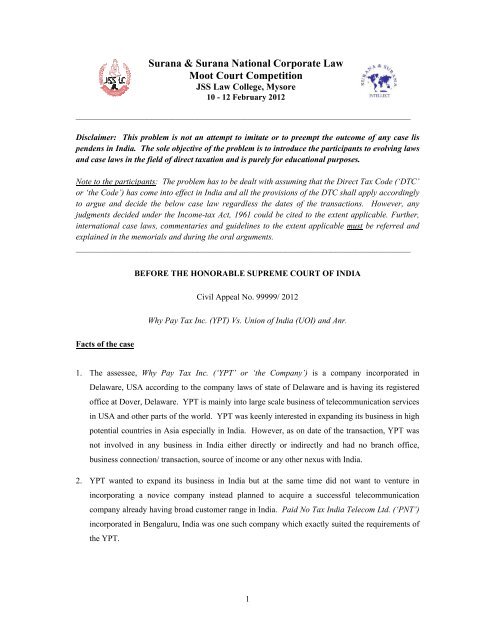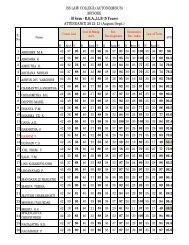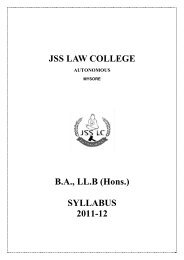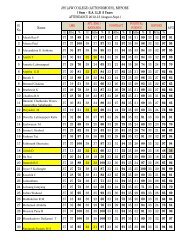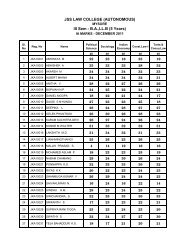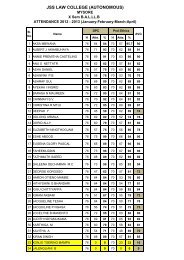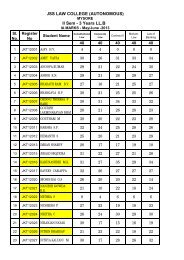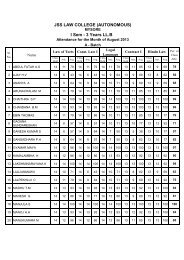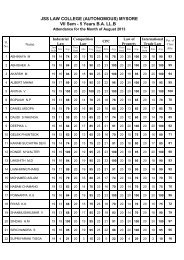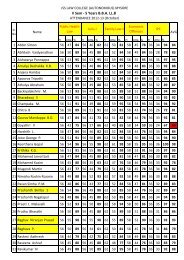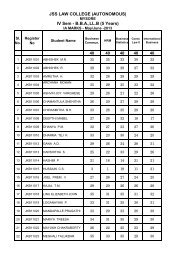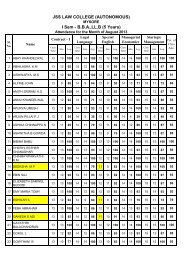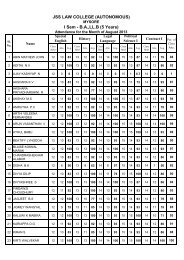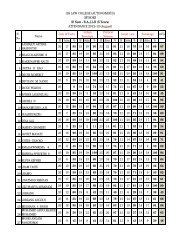Surana & Surana National Corporate Law Moot ... - JSS Law College
Surana & Surana National Corporate Law Moot ... - JSS Law College
Surana & Surana National Corporate Law Moot ... - JSS Law College
You also want an ePaper? Increase the reach of your titles
YUMPU automatically turns print PDFs into web optimized ePapers that Google loves.
<strong>Surana</strong> & <strong>Surana</strong> <strong>National</strong> <strong>Corporate</strong> <strong>Law</strong><br />
<strong>Moot</strong> Court Competition<br />
<strong>JSS</strong> <strong>Law</strong> <strong>College</strong>, Mysore<br />
10 - 12 February 2012<br />
________________________________________________________________________________<br />
Disclaimer: This problem is not an attempt to imitate or to preempt the outcome of any case lis<br />
pendens in India. The sole objective of the problem is to introduce the participants to evolving laws<br />
and case laws in the field of direct taxation and is purely for educational purposes.<br />
Note to the participants: The problem has to be dealt with assuming that the Direct Tax Code (‘DTC’<br />
or ‘the Code’) has come into effect in India and all the provisions of the DTC shall apply accordingly<br />
to argue and decide the below case law regardless the dates of the transactions. However, any<br />
judgments decided under the Income-tax Act, 1961 could be cited to the extent applicable. Further,<br />
international case laws, commentaries and guidelines to the extent applicable must be referred and<br />
explained in the memorials and during the oral arguments.<br />
________________________________________________________________________________<br />
BEFORE THE HONORABLE SUPREME COURT OF INDIA<br />
Civil Appeal No. 99999/ 2012<br />
Why Pay Tax Inc. (YPT) Vs. Union of India (UOI) and Anr.<br />
Facts of the case<br />
1. The assessee, Why Pay Tax Inc. (‘YPT’ or ‘the Company’) is a company incorporated in<br />
Delaware, USA according to the company laws of state of Delaware and is having its registered<br />
office at Dover, Delaware. YPT is mainly into large scale business of telecommunication services<br />
in USA and other parts of the world. YPT was keenly interested in expanding its business in high<br />
potential countries in Asia especially in India. However, as on date of the transaction, YPT was<br />
not involved in any business in India either directly or indirectly and had no branch office,<br />
business connection/ transaction, source of income or any other nexus with India.<br />
2. YPT wanted to expand its business in India but at the same time did not want to venture in<br />
incorporating a novice company instead planned to acquire a successful telecommunication<br />
company already having broad customer range in India. Paid No Tax India Telecom Ltd. (‘PNT’)<br />
incorporated in Bengaluru, India was one such company which exactly suited the requirements of<br />
the YPT.<br />
1
3. PNT is an Indian company having the following share holding patterns:<br />
Help Tax Avoidance<br />
(‘HTA’)<br />
Tax Free Telecom<br />
(‘TFT’)<br />
Need Not Pay Tax<br />
(‘NNPT’)<br />
Paid No Tax<br />
(‘PNT’)<br />
4. It was sufficient for the assessee/ YPT to acquire 100% of shares of TFT from HTA as such an<br />
acquisition would give complete control over the drop down companies including the Indian<br />
company PNT, which is the target company. Therefore, YPT entered into Share Purchase<br />
Agreement (‘SPA-I’), under which it was agreed that HTA would sell all its shares that it held in<br />
TFT to the assessee. However, just before purchasing the shares as agreed upon by the assessee<br />
from HTA, some of the pending matters with regard to identical transactions were decided by<br />
some Indian courts all of which were against such nonresident purchasers. The judgments held<br />
that such nonresident purchasers would be liable to withhold tax at the time of payment of sale<br />
consideration to any other nonresidents if the underlying capital assets and/ or interests in such<br />
capital assets which are sold are in India. Apprehending such judgments could cover the above<br />
transaction (though such judgments were decided only by High Courts, Authority for Advanced<br />
Ruling (‘AAR’) and Tax Tribunals), the assessee and HTA revoked SPA-I and entered into<br />
another fresh share purchase agreement (‘SPA-II’).<br />
5. The outcome of SPA-II, inter alia, were as follows:<br />
i. The assessee would purchase not the shares of TFT from HTA instead the assessee would<br />
purchase all the shares which NNPT holds in PNT.<br />
ii. TFT would grant the necessary authorization for the transaction as it holds 100% in NNPT<br />
2
iii. HTA being the ultimate parent company would grant the necessary authorization permitting<br />
TFT to authorize NNPT to sell the shares to the assessee/ YPT at the agreed rates.<br />
6. In the above agreement both HTA and TFT were not parties to the agreement but were only<br />
mentioned in the recital to show the holding structure of the selling company i.e. NNPT. The<br />
parties to the agreement were only the assessee and NNPT. The agreement was executed in<br />
Mauritius as per the laws of Mauritius. None of the transactions happened in India and this was<br />
an arrangement/ agreement/ transaction which entirely happened out of India including the<br />
payment and receipt of the sale consideration.<br />
7. The agreement was executed and the sale consideration was paid to NNPT by the assessee as<br />
agreed upon. As a development after the transaction, NNPT transferred the entire amount to TPT<br />
being its parent company and TPT in turn transferred the entire amount to its parent company<br />
HTA. However, a minor spread of income was left at NNPT and TPT on this transaction. In<br />
short, it appeared as though the transaction was like a back-to-back arrangement by these group<br />
companies. Also, it was equally possible that the chain of events was merely coincidental. Also,<br />
the above cash movement occurred relatively in a shorter time after the sale transaction took<br />
place. This left HTA happy as it achieved indirectly what it could not achieve directly. The total<br />
sale consideration in Indian Rupees was INR 10,000 crores which was paid by the YPT to NNPT.<br />
8. The Income-tax department of India on knowing the various money movements and change in<br />
ownership structure of the telecom major PNT, wanted to know the details of the transaction to<br />
ensure that any tax that is liable to be paid or to be withheld in India has not escaped. Therefore,<br />
one of the Joint Commissioners of Income-tax (‘JCIT’), Range 100, Bengaluru Circle under the<br />
powers conferred under section 134 read with section 140 of the Direct Tax Code (‘DTC’ or ‘the<br />
Code’) issued a notice to PNT and also to the YPT/ assessee calling for all the information<br />
regarding the above transaction. YPT without resorting to questioning the jurisdiction of the JCIT<br />
in issuing such notice was more than willing to cooperate with her/ him and shared the<br />
documents.<br />
9. On perusing the documents especially the SPA, the JCIT was convinced that the whole<br />
transaction was to evade the withholding tax liability in India on the sale of shares by NNPT held<br />
in PNT to the assessee and therefore, referred the matter to the Director of International Tax<br />
(‘DIT’) for his consideration and appropriate action. On instructions from the DIT, the Deputy<br />
Director of International Tax (‘DDIT’), Bengaluru Circle issued a show cause notice (‘SCN’)<br />
under section 194 read with section 214 of the Code to the assessee/ YPT, requiring it to show<br />
cause as to why “Why Pay Tax Inc. (‘YPT’) should not be deemed to be an assessee in default<br />
(‘AID’) for failing to withhold the applicable capital gains tax while making the sale<br />
consideration to NNPT for the purchase of PNT shares”. The DDIT fixed a hearing requiring<br />
3
YPT to appear through its representative on the date fixed and submit such records and evidences<br />
in support of its case failing which YPT would be deemed to be an AID and the consequences<br />
under the Code shall follow.<br />
10. YPT, without agitating the jurisdiction of the DDIT keeping in mind some of the adverse<br />
Supreme Court judgments, fully complied with the DDIT’s notice and produced such documents<br />
and records to establish primarily that:<br />
i. There is no need for YPT to withhold any tax on the sale consideration as the whole<br />
transaction occurred out of India;<br />
ii. None of the properties transacted were situated in India;<br />
iii. This was purely a transaction occurring between two nonresidents situate out of India and<br />
therefore, neither the DTC nor the Indian income-tax authorities have locus to tax such a<br />
transaction;<br />
iv. Since the alienator of PNT shares is a resident of Mauritius, applying the Double Taxation<br />
Avoidance Agreement (‘DTAA’) between India and Mauritius, certain judgments of the<br />
Hon’ble Supreme Court of India and certain circulars of the Central Board of Direct Taxes<br />
(‘CBDT’), the Indian income-tax authorities have no powers or jurisdiction to tax such a<br />
transaction;<br />
v. The Indian income-tax authorities are bound to honor such treaties as per Article 51(c) of the<br />
Constitution of India; and<br />
vi. The assessee cooperates in the proceeding under protest in writing.<br />
11. After patiently hearing the submissions of YPT and after perusing all the documents submitted by<br />
YPT in this regard, the DDIT passed an order under section 194 read with section 214 of the Code<br />
as under:<br />
i. That the whole transaction is sham and colorable;<br />
ii. The main purpose of canceling the earlier agreement where the transaction was supposed to<br />
be between YPT and HTA and later on modifying the agreement in which the shares of PNT<br />
would be bought from NNPT is to evade the Indian income-tax;<br />
iii. Though the transaction has occurred between two nonresidents, the underlying capital asset<br />
(i.e. the assets of PNT and PNT as such) are situated and incorporated in India and therefore,<br />
the authorities under the DTC have sufficient powers to tax such a transaction;<br />
iv. Section 5 of the Code (Income deemed to accrue in India) is wide enough to cover such<br />
transactions<br />
v. Section 123 of the Code [i.e. General Anti Avoidance Rule (‘GAAR’)] grants wide powers to<br />
the income-tax authorities to tax such transactions. The Code being a statute later in time<br />
than the DTAA entered into between India and Mauritius, the Code shall prevail over the<br />
DTAA.<br />
4
vi. The principles laid down under Part IV of the Constitution of India is mere directive and is<br />
neither binding nor enforceable especially when the compliance of Article 51(c) of the<br />
Constitution would jeopardize the sovereignty of India’s power to legislate statutes to<br />
safeguard its revenue interests. Further, Article 51 only expects that the State shall endeavor<br />
to comply with any treaty obligation and does not compel it to do so especially when India’s<br />
interests are at risk.<br />
12. Making the above observations, the DDIT passed an order levying tax at the rate of 20% being<br />
long term capital asset along with applicable surcharge and cess amounting to INR 2,060 crores.<br />
Further, a penalty equivalent of the tax payable was also levied under section 230 of the Code.<br />
Further, interest under section 214 of the Code was also levied.<br />
13. Against the impugned order, the assessee/ YPT immediately filed a writ petition in the Bangalore<br />
High Court vide W.P. No. 99999/ 2012 inter alia praying that:<br />
i. the order of the DDIT is non est in law and has flagrantly violated the settled principles of<br />
Indian income-tax law and has traveled beyond its territorial limits by applying on a<br />
transaction happened completely out of India;<br />
ii. the order has overtly violated the obligation of international treaty obedience and comity and<br />
has opened the Pandora box of transgressing the directive principles of state policy of the<br />
Constitution of India;<br />
ii. the order is patently per incuriam of the order of the Supreme Court of India upholding the<br />
validity of the India-Mauritius tax treaty;<br />
iv. the assessee in its writ petition challenged the constitutional validity of the provisions of<br />
GAAR of the Code which empowers the tax department to disregard an arrangement and<br />
restructure it in its own style stepping into the shoes of the corporations and thereby,<br />
declaring any transaction as sham and a colorable device. Also, it challenged the provisions<br />
of section 5of the Code in so far as it permits the taxation of sale of underlying capital assets<br />
in India on a transaction completely happening outside India<br />
v. to quash the order the passed by the DDIT and hold that the DDIT had no jurisdiction to issue<br />
the SCN and pass the impugned order<br />
14. After detailed hearing and consideration, the Hon’ble High Court dismissed the writ petition<br />
upholding the validity of the Code and held that as long as an extra territorial transaction has any<br />
nexus with Indian assets, then it is deemed to be Indian source income and therefore, taxation by<br />
source country is an accepted principle in international taxation. Further, the court held the<br />
directive principles of state policies under Part IV of the Constitution is unenforceable by any<br />
court and it is the prerogative of the State to decide as to when the treaty obligations could be<br />
overstepped especially when the interests of the country is at peril. However, the court directed<br />
the income-tax department not to indulge in any tax recovery proceedings until the matter<br />
approaches the Supreme Court if the aggrieved party prefers any special leave petition.<br />
5
15. On filing of the Special Leave Petition, leave was granted and matter was directed to be heard on<br />
SLP paper books. Considering the importance of the matter, the matter was placed for<br />
consideration before a Constitutional Bench. On behalf of Union of India, the learned Attorney<br />
General of India and the learned Solicitor General of India are appearing along with other central<br />
government counsels and on behalf of the assessee a catena of top brass Supreme Court senior<br />
advocates is appearing.<br />
16. The Hon’ble Supreme Court has sought the counsels appearing for either side to address the<br />
following issues and granted liberty to raise any other questions of law which are relevant to the<br />
case in adjudication:<br />
i. Maintainability<br />
a. Whether the writ petition before the High Court was maintainable<br />
b. Whether alternative remedies were exhausted before approaching the High Court<br />
c. Whether the DDIT had powers to issue SCN to the assessee<br />
ii. Constitutionality and income tax<br />
a. Whether the GAAR provision and income deemed to accrue in India provision of the<br />
Code have violated the Constitution, settled tax treaties and territorial limits of India<br />
b. Whether international treaty obligations under the Constitution have been flouted merely<br />
on the fact that India is not a signatory to the Vienna convention<br />
c. Whether the Code being a law later in time would prevail over DTAA. Scope of such<br />
doctrine?<br />
d. Can legislation unilaterally tax a transaction happening exclusively out of India between<br />
two nonresidents?<br />
iii. Other issues<br />
a. Whether SPA-II was sham and was purely to treaty shop<br />
b. Who is the beneficial owner in the transaction?<br />
c. Did the DDIT commit per incuriam by not following the settled judgments of this Court?<br />
d. Such other issues as may be raised by the counsels with the leave of the Court<br />
6


